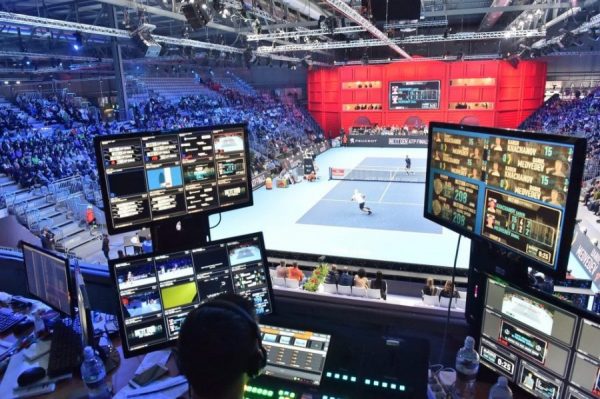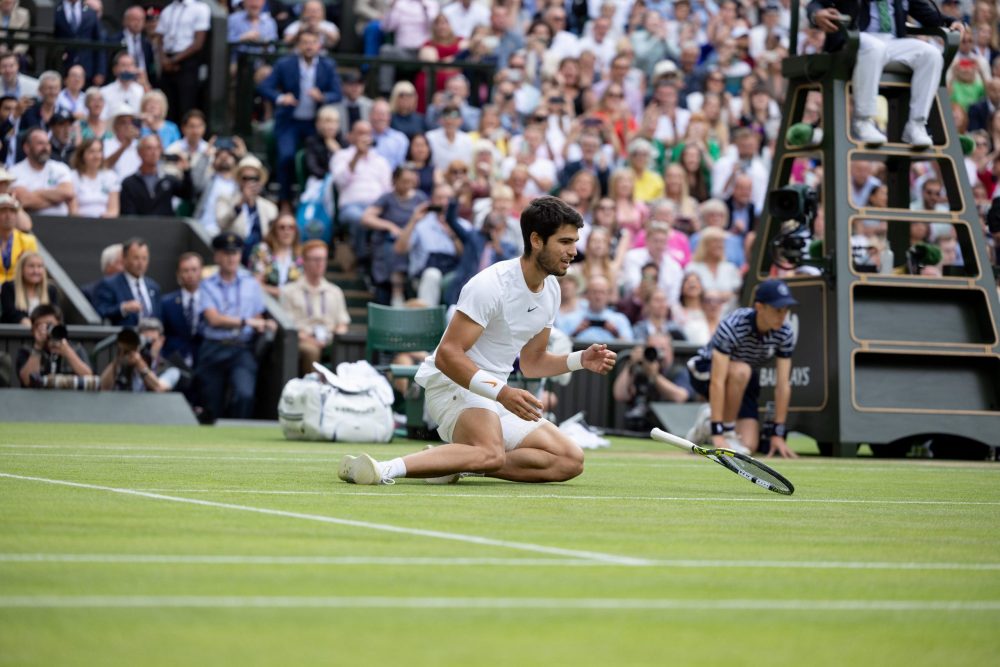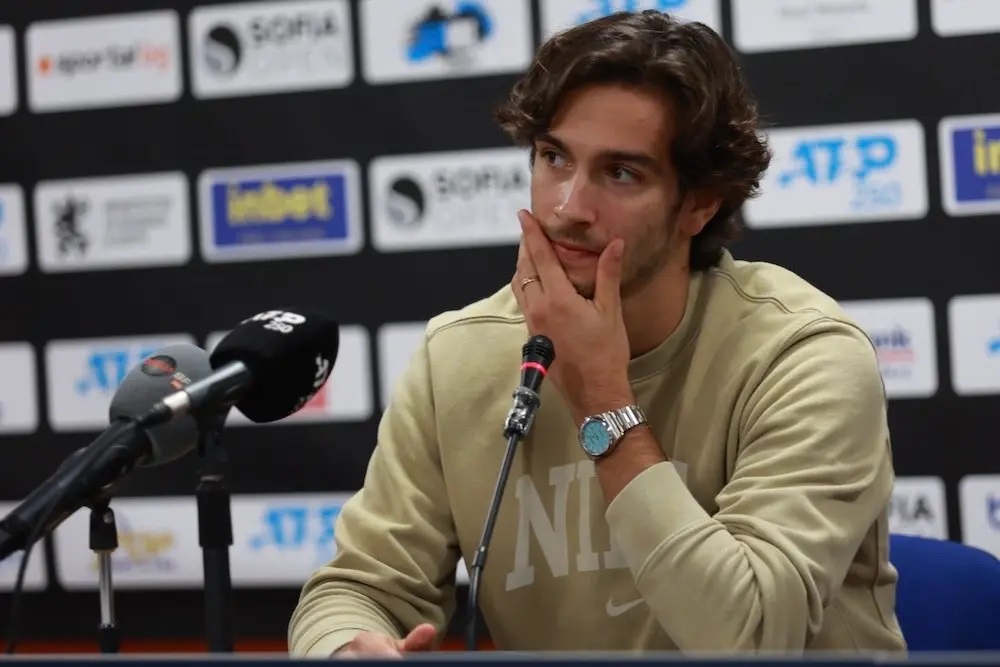NOTE: This article was written in Italian and has been Translated by Carla Montaruli
Carlitos Alcaraz triumphed, cheers for Carlitos Alcaraz. The feat he accomplished at only 20 years of age and in his fourth tournament on grass is remarkable, remarkable indeed. He is the third youngest champion ever after 17-year-old Becker and 20-year-old Borg, as well as the third Spaniard after Santana and Nadal to win the trophy. Being able to beat a player in the fifth set after 4 hours and 43 minutes who is the king of marathons, a seven-time champion and had won 45 straight matches over the last 10 years on Centre Court, can only be considered a great exploit.
Credit where credit is due. Alcaraz played beautiful tennis, complete in all aspects, bold forehands and backhands, powerful and hit on the rise, drop-shots, acrobatic and diving volleys, hanging smashes, aces and winning serves. All this with great mental solidity displayed throughout the entire match: after losing the first set badly, enduring the tension of a second set tiebreak which had not started well for him, then dominating the third set and finally closing the encounter as a consummate veteran in the fifth with a last service game played brilliantly after tenaciously defending very well the break he had secured in the third game of the final set.
A 20-year-old young man could not be asked for more. A well-deserved applause and congratulations also for defending that first place in the world rankings that he will hold for the twenty-ninth week, hoping to keep it as long as possible.
Staying at the top for 389 weeks like the extraordinary champion he beat on Sunday would mean dominating the world stage for over seven years. Over seven years! And…as I write this I wonder if we have paid enough attention to such a feat in all that time!
Yes, because you write 310 weeks, Federer’s weeks as world No.1, then you write 389, that is Djokovic’s weeks spent in the same spot: there and then they seem like just numbers…but only when you divide them by 52, the weeks in a year, do you realize the immensity of these extended dominances within a sport whose growing competitiveness and many booming young guns are emphasized almost every day.
Crazy.
Crazy in the case of both Federer and Djokovic with the ATP scepter in their hands, because each of them – as the fourth part of the Fab Four – had to confront at least with the other three. All four have been world number one. Still, for 699 weeks, almost 13 years and a half, Roger and Nole were number one, Nadal was king for 209 weeks and Murray for 41. Add them up and that’s another five years—eighteen years of reign for four kings. Written so many times off the top of my head…but upon reflection this is impressive stuff. It never remotely happened before.
So here it is… the idea that Carlitos Alcaraz could one day – but we are talking about seven years! – reach Djokovic’s 389-week reign today may seem unreal, absolutely far-fetched.
But…are there perhaps three more champions on the horizon who can recreate a quartet of phenomena like the Fab Four? I don’t see them at all. Will Alcaraz be alone in the driver’s seat for the next few years?
In seven years, 10 or 18 – 18 years was the reign of the Fab Four — phenoms could sprout up almost like mushrooms! Speculating on what will happen in such a long and far away period is a mindless divertissement and I don’t know why it dawned on me…. Except perhaps Holger Rune today – though greatly downgraded by the last duel here at Wimbledon – there doesn’t seem to be a rival of Alcaraz’s caliber right now. Our compatriots may see our Sinner two steps below Alcaraz and one step below Rune, but neither do they see other “prospects” ahead of him. Djokovic called Sinner one of the leaders of the new generation. His fifth place in the Race, along with eighth in ATP ranking certify such status.
But then for a year or two, or maybe even three, if Rune and Sinner don’t make giant strides, or if a new rising star doesn’t emerge, Carlitos Alcaraz could easily add a hundred or more weeks to the 29 he has already earned as No. 1.
Or am I venturing into a wild prediction?
Just not to present you with a single scenario I want to say, however, that the most obvious commonplace one could come up with today, after this final that Djokovic shall not cease to regret for at least four reasons – three missed backhands in the tiebreak and a clumsy drive volley which squandered a hard-earned break point for a 2-0 lead in the decider – is that we have witnessed the changing of the guard.
It will make so many headlines, sure. I may have uttered it too, in one of the many videos I did for Ubi Instagram, for Ubitennis, and the IntesaSanPaolo website. But in my opinion, it’s not true yet.
Djokovic is not ready to retire. He is not going to quit, even if the dream of achieving a Grand Slam has vanished, maybe forever. Farewell to Grand Slam, but will he win more Majors? I think so. He is still world No. 2, isn’t he?
I had written throughout the tournament – you may check – that I didn’t think I had seen the best Djokovic. He had not been at his best against Hurkacz or even Rublev. And, as much as many readers disagreed, neither had he dominated Sinner as he had last year in the last three sets when he had been truly unplayable. Demerit to him and credit to Sinner, as often happens simultaneously.
I wrote that Hurkacz had thrown the first set out of the window and when leading 5-4 in the tiebreak of the second with two serves at disposal to put it away he had not been faultless but had shown a lack of personality. I also wrote that Rublev had been unlucky in the fourth set on the occasion of some break points he had failed to convert.
We did not see the best Djokovic, in my opinion, even in the final against Alcaraz. Otherwise, he would have been two sets up.
Oh yes, come on: the three backhand errors he made in the first tiebreak he lost after 15 won were not errors from Djokovic, the champion who has always played the crucial pointsbetter than anyone else, certainly better than Federer and Murray, perhaps equal to Nadal.. In particular, match points aside – what about that, dear Roger? – those tiebreaks that are said to be worth double.
Those three backhands, a drop shot at 3-2 when he was a minibreak ahead, the one at 6-5 and setpoint after he had deftly returned Carlitos’ serve, the one at 6-6 were errors worthy of a Hurkacz, a Norrie or a Shapovalov, not a Djokovic!
I recall – just quoting from memory because I haven’t time to engage in dutiful and thorough research – that Nole’s record in best-of-five matches after winning the first set is monstrous. Imagine after winning the first two sets.
Here, a Nole in ordinary form, even against that very inspired Alcaraz, would have started the third set with a two-set lead.
I know that with ifs and buts, you don’t go anywhere. But I’m pretty sure – and I think Nole is too – that if the two sets lead never came into being, it was more because of Nole’s demerit than Carlitos’ merit.
But is this a random demerit, due to a bad day and a series of bad days as it appeared to me throughout the tournament, or is it a sign of the slow inexorable decline of the Serbian who is beginning to come to terms with his age? That drive volley with which he dissipated the all-important break point and the chance to rise 2-0 in the fifth set was another topical moment. Yet, it was not Novak to succeed in a decisive breakthrough, but Carlos three minutes later.
The fury with which, at the changeover, Nole smashed his racket on the net post is revealing. Nole had missed the train to victory and, experienced as he is, he understood it.
I would say that this casual contingent demerit or signal of inexorable decline is the discriminating point of our debate.
Bravo, bravo to Alcaraz for taking advantage of it with precocious maturity, but did Djokovic stumble over a mediocre day by chance, because it can happen to everyone, even to younger tennis players, or because even he – an extraordinary phenomenon – is on that rickety path where age starts taking its toll?
If the most plausible answer we believe in is the first one – and that is the one I believe in – we cannot yet speak of a changing of the guard.
Djokovic can safely return to the throne of tennis, perhaps win the US Open and/or the next ATP Finals in Turin as well as an 11th Australian Open. Push the undoubtedly great Alcaraz back to second place.
If, on the other hand, the right answer is the second, this Wimbledon definitely enshrines the changing of the guard. But, even in this scenario, only the changing of the guard at the top and the handover between Djokovic and Alcaraz. Not a generational changing of the guard though, at least for now and the very near future, because even a subdued and slightly tarnished Djokovic is stronger than Rune, Sinner, and Tsitsipas on almost any surface. At worst he would be the second-best tennis player in the world. The others, Sinner included, would do anything to stand where he stands.



 Hot Topics3 days ago
Hot Topics3 days ago
 Latest news3 days ago
Latest news3 days ago
 Hot Topics2 days ago
Hot Topics2 days ago
 Hot Topics3 days ago
Hot Topics3 days ago
 Focus2 days ago
Focus2 days ago
 Focus2 days ago
Focus2 days ago
 Focus3 days ago
Focus3 days ago
 Hot Topics2 days ago
Hot Topics2 days ago


























